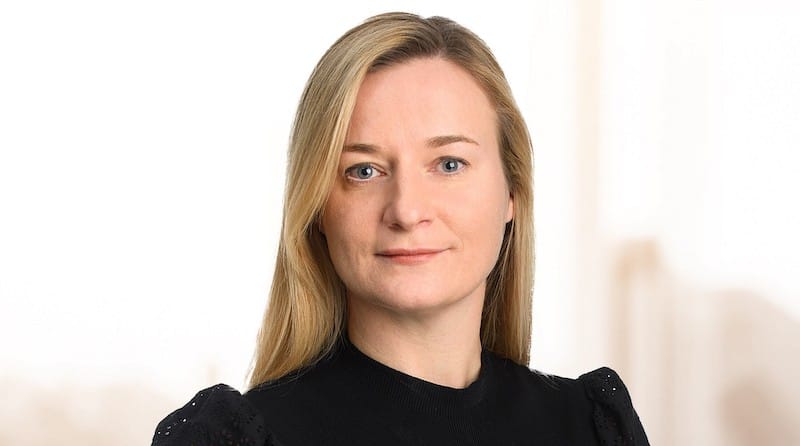Ahead of her appearance at next week’s Legal Cheek event, Willkie partner Jennifer Tait speaks about life in the capital markets group

“Moving to London was a fantastic opportunity for me,” says Jennifer Tait, capital markets partner at Willkie Farr & Gallagher’s London office. Having qualified in Ireland in 2006, she decided to move across the pond for her master’s degree at New York’s Fordham University School of Law. It was there that she was recruited by a law firm in New York, before joining Willkie.
“I moved to London in 2012, as part of the growth of the London office and the capital markets practice ,” says Tait. “Willkie was beginning its real growth in London at the time, and I was a part of around ten lawyers contributing to that initial growth .” A decade on, the London office has over 120 lawyers, and 180 staff in total.
But moving to the UK did not present any ‘culture shock’ to Tait in terms of the work. “I was still at a US law firm so the calibre of the work and the nature of clients’ expectations and their sophistication was pretty much the same,” she says. “My work in capital markets has always been international. The US has deep pockets of institutional capital and clients raising capital in London and Europe will seek to access that. This means that very often capital raises that we work on will either be rooted in US securities laws or have US securities laws components.”
Tait’s work in the London capital markets team tends to be varied. “I am responsible for a broad range of work. Sometimes, I advise on initial public offerings (IPOs) in the US or the UK. We recently completed an IPO on the New York Stock Exchange, for example, which was one of the first IPOs since the start of the slowdown in the equity capital markets around 18 months ago,” she tells me. “IPOs come up episodically in a career, and the mainstay of my work is on the debt side, working on bond offerings for clients raising capital, either to support their ongoing operations, or for private equity clients to fund acquisitions of companies..”
The lifecycle of an IPO
Tait goes on to explain the role of a lawyer in a typical IPO transaction.
One of the first steps is where a client who is considering taking their company public contacts their law firm. “This is not something that most people would necessarily be aware of, but lawyers get involved very early on in the process — i.e. when the client is first thinking about a potential listing,” she tells me.
“Once the decision to list is made, the second step is to consider which market the client would like to list in,” she tells me. “Here, we often consider different markets like London, certain European markets and the US. Considering these different jurisdictions is a part of the initial analysis. Investment bankers are also involved in advising from the outset as they guide the client on where they think the IPO will be most successful for its particular profile.”
The next step is usually considering any pre-IPO reorganisation of the company that may need to occur, and in parallel getting started on drafting the prospectus or registration statement. This document includes all of the relevant disclosure potential investors would want to know about before making a decision to invest in the company, including, for example, an overview of the company’s business and recent operating results.
“Sometimes we can work on a prospectus or registration document for over 12 months, together with the client, the investment banks and their counsel to make sure the document is a fulsome disclosure of all relevant details,” explains Tait. “The rules require that any offering document is accurate and complete in setting out for investors information that is material to their investment decision. And this is what we ensure when drafting these documents.”
Macro-economic trends impacting clients
“It is no secret that there have been some headwinds in macro-economic trends driving the world economy. These include the Russian invasion of Ukraine, sustained high inflation and rising interest rates,” Tait explains. “In M&A activity for example, which has a knock-in effect in capital raising and lending, high inflation increases costs for businesses, which can have a knock-on effect on consumer demand for the products. This can significantly affect business valuations and sellers lining up for sales may decide to delay selling businesses.”
Similarly, rising interest rates can mean that it becomes more expensive for buyers to borrow capital for an acquisition. “But we are still seeing deals getting done for good assets, meaning healthy, well managed companies with strong growth prospects,” Tait tells me.
Training at a top US outfit in London
When we chat, Tait also touches upon the training structure at a firm like Willkie. Offering approximately six training contracts in London each year, the firm, like many of its US rivals, ensures its trainees have high levels of responsibility.
“We are a lean team and this means that our trainees get involved with everything we do,” she says. “We believe in allowing our trainees to test their ability but with the presence of a safety net. Trainees are given great amounts of responsibility on every deal, but we are always there to support them and to review their work before sending it to the client.”
The structure of US law firms tends to be different as compared to UK-headquartered firms. “US firms tend to be more collaborative and to have greater connectivity across practice groups and to be less siloed in their organisation. For example, of potential interest to trainee candidates, and bringing it back to capital markets as one example, English-orientated firms often have distinct departments for equity capital markets and debt capital markets, which isn’t always the case with US firms. We aim to give a rounded experience of different aspects of the practice of capital markets and securities laws within one single area,” Tait tells me.
Application advice
With loads of work to get through, it’s not surprising that interviewers look for candidates who are enthusiastic about the firm’s practice areas and its clients. “What stands out for me is how earnest, interested and energetic a candidate is during their partner interview,” says Tait. “Nobody expects a trainee to show up on the first day pre-programmed. We are all learning on the job and honing our skills: it’s the trainees with a ‘can do’ attitude who stand out from the crowd.”
Jennifer Tait will be speaking at ‘Market trends for 2024 — with Willkie’, a virtual student event taking place next Tuesday. Apply now to attend.
About Legal Cheek Careers posts.


